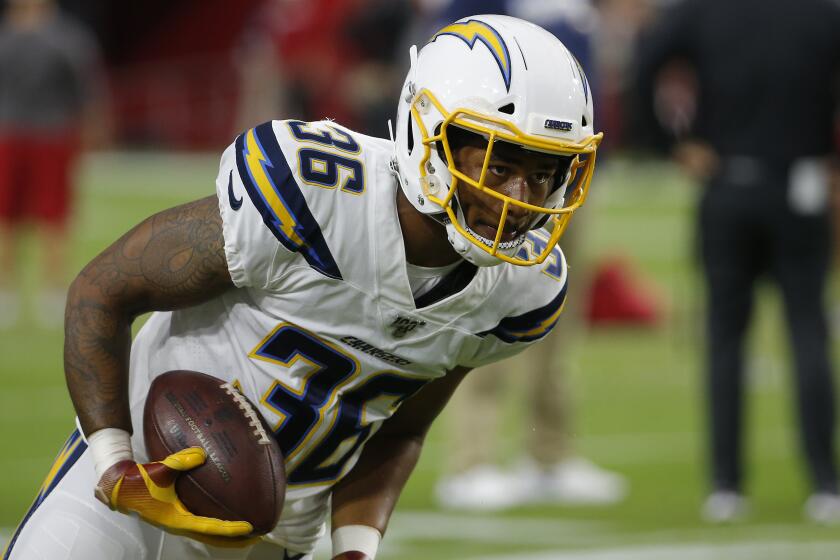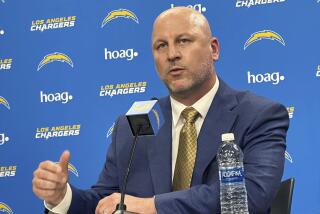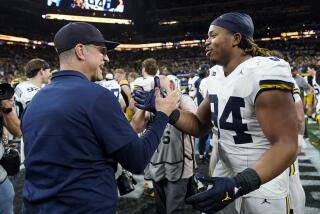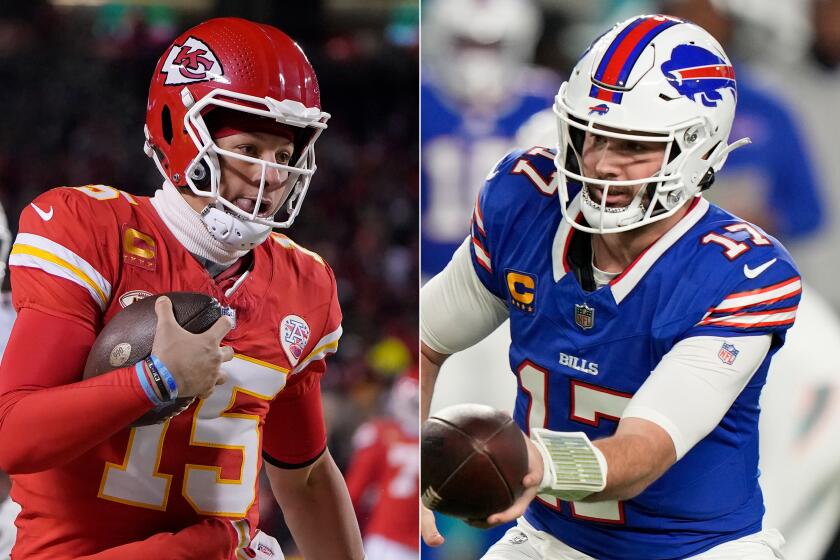Column: Injury-depleted Chargers should trade holdout Melvin Gordon
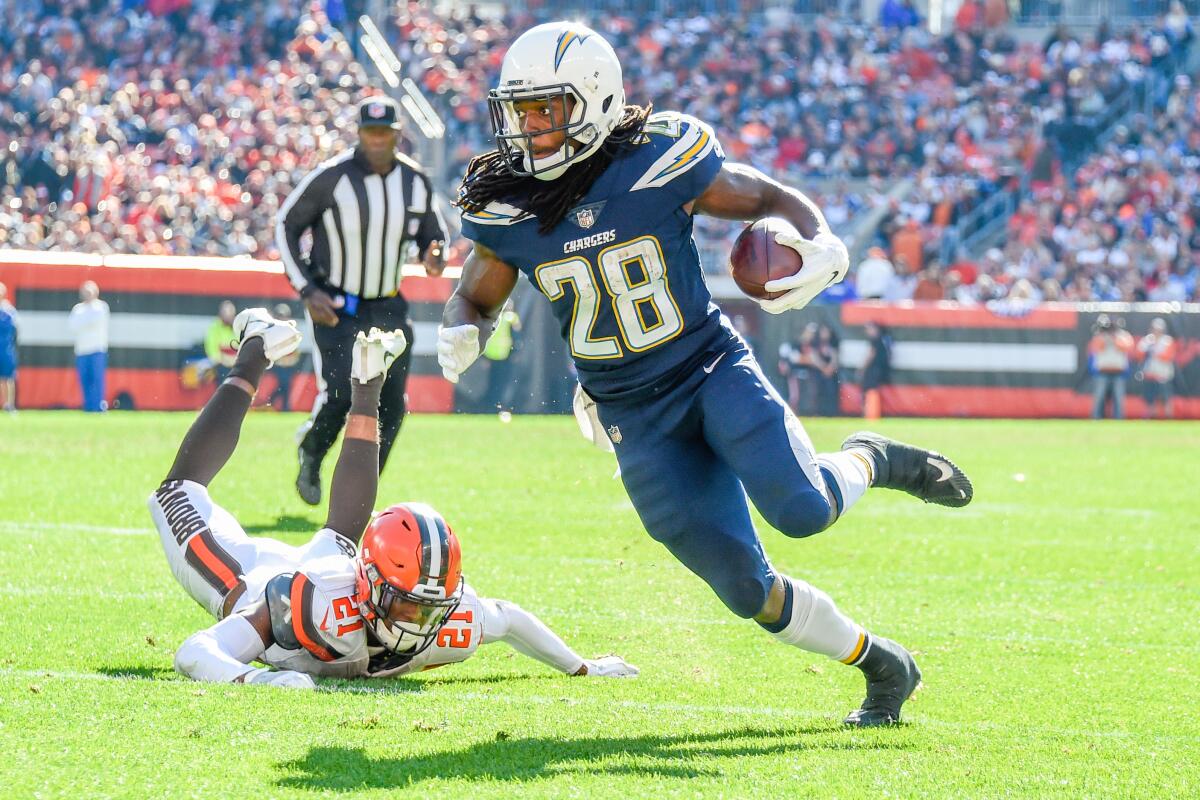
- Share via
The sensible option would be to wait.
Wait for Melvin Gordon to report, wait for the Pro Bowl running back to play his way back into rhythm, wait to deal with his unsolved contract situation.
This is who the Chargers are. This is what they do.
They are conservative. They are methodical.
Their deliberate approach has worked to the extent that it has produced the Super Bowl-contending team they are fielding this season.
Changes in circumstances, however, require adjustments in philosophy. Their situation now calls for that. They have to actively shop Gordon.
Look at the depth chart as the team prepares for a visit from the Houston Texans on Sunday. Count the number of players who are down.
Coach Anthony Lynn steadfastly refused to blame the defeat to Detroit last week on a depleted roster, but even he acknowledged, “Never had this many [injuries] this early, to be honest with you. This is usually what you see around Week 12, Week 13. Some of this adversity hit sooner than we thought.”
Left tackle Russell Okung remains sidelined after suffering a pulmonary embolism caused by blood clots. Safeties Derwin James and Adrian Phillips are on injured reserve. Tight end Hunter Henry is out with a fractured knee. Cornerback Michael Davis has a hamstring injury and is listed as doubtful.
If only the Chargers had the trade capital to address the holes that have suddenly emerged.
With the Chargers’ Adrian Phillips sidelined because of a broken arm, Roderic Teamer is set to make his NFL starting debut at safety against Houston.
Oh, right.
Gordon, who is in the final year of his rookie deal, continues to hold out over a contract dispute. He’s looking for an extension worth similar to what the league’s top running backs are paid, somewhere in the neighborhood of $13 million annually. The Chargers offered him a deal worth around $10 million a year.
This isn’t to say Gordon isn’t deserving of the contract he demands. The dispute is simply byproduct of a salary cap system used by owners who oppose a free market only when it cuts into their earnings.
General manager Tom Telesco said the Chargers won’t revisit extension talks until after the season. Gordon has demanded a trade and the Chargers have granted him permission to look for a deal.
The Chargers now have to take control of the situation and play a more proactive role in the process.
The NFL’s trade market has been unusually active, with deals in recent weeks including the likes of Laremy Tunsil, Jadeveon Clowney and Minkah Fitzpatrick. All-Pro cornerback Jalen Ramsey has requested a trade from the Jacksonville Jaguars.
If the Chargers aren’t feeling a sense of urgency, they should.
The clock is ticking. The calendar pages are turning. The team’s window is closing.
Philip Rivers is 37. He has declared his intention to play in 2020, but the Chargers could very well be searching for their next franchise quarterback the year after that.
And it’s not only Rivers.
They have a couple of dominant pass rushers in Melvin Ingram and Joey Bosa. They have Ingram on a long-term deal, but Bosa is nearing the end of his rookie contract and could depart as a free agent after the 2021 season.
Henry will be a free agent at the end of the season.
Barron Hilton founded the L.A. Chargers, though the team soon left for San Diego
The Chargers don’t have the luxury of wasting this kind of opportunity. They are in their third season in Los Angeles, but remain barely noticed.
That’s OK now, with the Chargers playing in the 27,000-seat Dignity Health Sports Park.
That won’t be OK next year, when they move into the 70,000-seat SoFi Stadium. Public indifference next year will translate into empty seats.
The Chargers have to win and they have to win now. Trading Gordon can help them do that.
Of course, finding a taker won’t be simple, especially in the early stages of the season. Any team that trades for Gordon will encounter the same problems the Chargers are facing with him — specifically, they will have to pay him.
Gordon has to play a portion of this season to make his rookie contract expire. But if a franchise tag is placed on him next year, he could threaten to do what Le’Veon Bell did in 2018, which is to not play and become a free agent at the end of the season.
So there are complications in trading Gordon. Without a long-term deal in place, no team will pay a significant bounty for him. At the same time, no team is likely to give him that long-term deal.
But Gordon is still an asset and he could be packaged as part of a larger deal. This could require a level of creativity for which the Chargers aren’t known, but the rewards of doing something unfamiliar could be equally foreign for the long-underachieving franchise: A championship.
More to Read
Go beyond the scoreboard
Get the latest on L.A.'s teams in the daily Sports Report newsletter.
You may occasionally receive promotional content from the Los Angeles Times.

